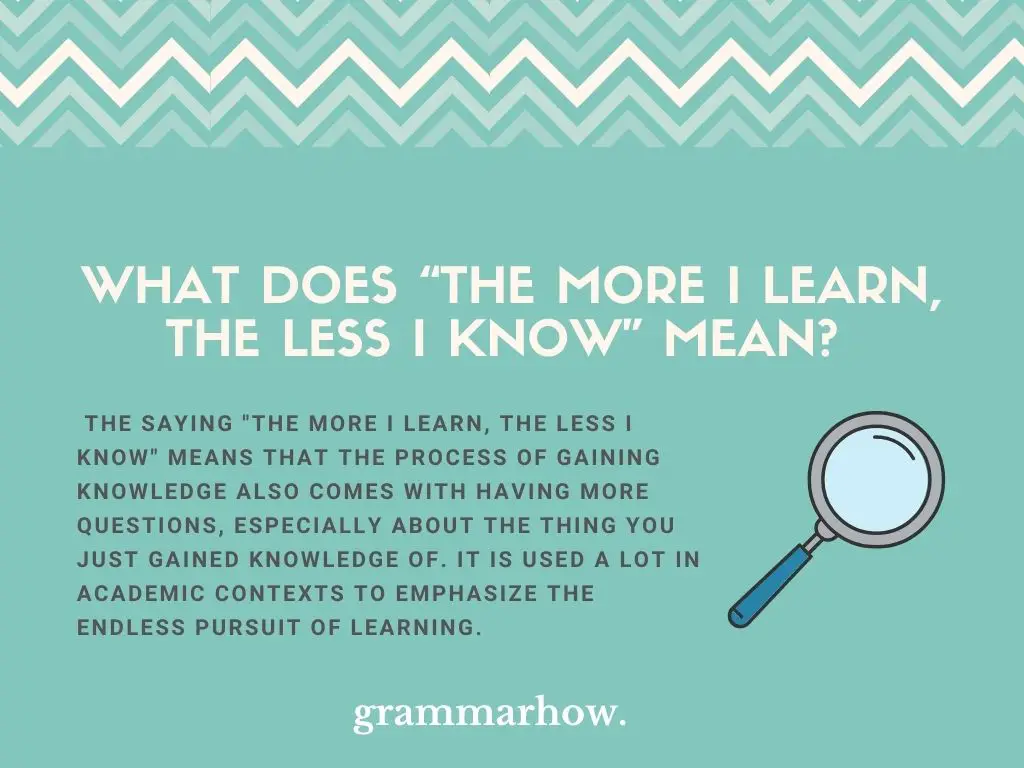The English language is chock full of expressions and sayings. These expressions and sayings are some of the things that make the language more colorful. In this article, we’ll be exploring the meaning and history of the saying “the more I learn, the less I know”.
What Does “The More I Learn, The Less I Know” Mean?
The saying “the more I learn, the less I know” means that the process of gaining knowledge also comes with having more questions, especially about the thing you just gained knowledge of. It is used a lot in academic contexts to emphasize the endless pursuit of learning.

The phrase “the more I learn, the less I know” is an expression that you have probably heard before.
Basically, the phrase means that the more knowledge you gain, the more questions you also gain, especially about the topic you just gained knowledge of.
For example, as a child, you learn that you are a living thing. As you grow older, the concept of being alive becomes more complicated. You begin to ask questions such as:
- When exactly does life begin?
- What differentiates humans from other living things?
- What constitutes life?
- Does conscious thought constitute life?
And when you find the answers to these questions, you are led to even more questions. These questions will lead to even more questions, and so on. It is impossible to learn something completely without having more questions about it.
You can often hear this phrase said in a variety of ways.
It is often used in an academic setting, by those who want to emphasize that the pursuit of learning is endless, such as professors. This phrase can also be said in a sarcastic or frustrated manner, by those who want to emphasize the difficulty of the topic they are studying.
Who Said “The More I Learn, The Less I Know”?
The phrase has its origin in Ancient Greece. In Plato’s account of the philosopher Socrates, the latter was said to attribute his great wisdom to his knowledge and acceptance that he knows nothing. This principle, also known as the Socratic paradox, is the same principle behind the saying “the more I learn, the less I know”.
The phrase (or at least, the principle behind the phrase) is an incredibly old one, dating as far back as Ancient Greece.
Socrates was a philosopher who was venerated for his wisdom. In fellow philosopher Plato’s account of Socrates, Socrates attributed his wisdom to his knowledge and acceptance that he knows nothing.
In other words, Socrates said that he is only wise because he knows that he knows nothing.
In the same way, the phrase “the more I learn, the less I know” says that the more knowledge one gains, the less one actually knows. It is a paradox of knowledge.
It is sometimes known as the Socratic paradox, although this title is also used to describe other paradoxical claims attributed to Socrates, such as the claim that no one ever knowingly does anything wrong.
Interestingly, there is some debate as to whether or not Socrates himself said this. The phrase has also been attributed to famously intelligent and wise people, such as Albert Einstein. However, there is no record of them actually having said it.
Variations of “The More I Learn, The Less I Know”
Variations of the phrase “the more I learn, the less I know” include the following:
- The older I get, the more I realize I know nothing
- I am only wise because I know I know nothing
- To be wise is to know you know nothing
- The more I know, the less I know
- The more I learn, the less I understand
- The more you study, the less you understand
- The more you learn, the more aware you are of how much you don’t know
- The more you learn, the more exposed you are to what you do not know
Final Thoughts
The saying “the more I learn, the less I know” is a popular expression that is used to emphasize the endless pursuit of learning. Another way of saying the phrase is that the more you learn, the more aware you are of how much you don’t know.

Martin holds a Master’s degree in Finance and International Business. He has six years of experience in professional communication with clients, executives, and colleagues. Furthermore, he has teaching experience from Aarhus University. Martin has been featured as an expert in communication and teaching on Forbes and Shopify. Read more about Martin here.
